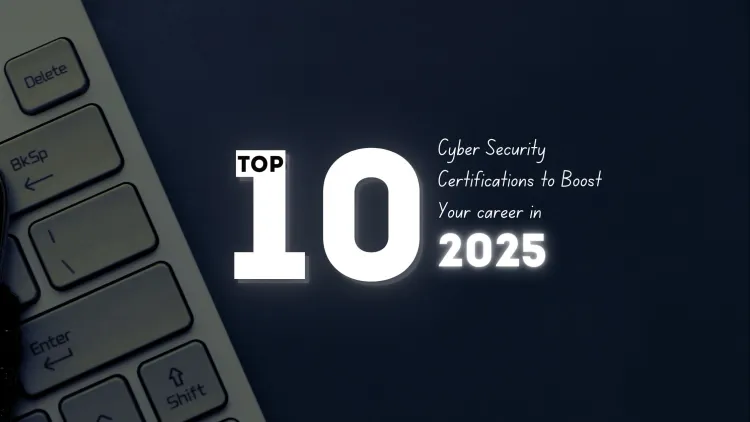Top 10 Cybersecurity Certifications to Boost Your Career in 2025
As cybersecurity threats continue to evolve, the demand for skilled professionals in the field is rising. Earning the right certifications is a key way for individuals to validate their skills and advance their careers in cybersecurity. In 2025, certifications such as CISSP, CEH, CISM, CompTIA Security+, and CCSP are essential for professionals looking to deepen their expertise, specialize in areas like ethical hacking, penetration testing, cloud security, or threat intelligence, and enhance their employability. Whether you're starting your career or aiming for leadership roles, these certifications are crucial for staying ahead in the competitive cybersecurity job market.

As cybersecurity threats continue to evolve in complexity and sophistication, the demand for skilled cybersecurity professionals has never been higher. Organizations are constantly looking for individuals who possess the knowledge and expertise to safeguard their digital infrastructures. With the increasing reliance on technology, securing data, systems, and networks is more critical than ever.
For cybersecurity professionals, staying ahead of the curve and continually enhancing their skills is essential. One of the best ways to ensure career growth and recognition in the cybersecurity industry is by obtaining the right certifications. In 2025, having the right certification will not only validate your skills but also set you apart in the competitive cybersecurity job market.
In this blog, we’ll explore the top 10 cybersecurity certifications for professionals in 2025 that will help you advance your career, deepen your expertise, and boost your employability in the field.
1. Certified Information Systems Security Professional (CISSP)
The Certified Information Systems Security Professional (CISSP) certification, offered by ISC2, is one of the most prestigious and widely recognized certifications in the cybersecurity industry. It is specifically designed for experienced security practitioners, managers, and executives.
What You’ll Learn:
- Security and risk management
- Asset security
- Security architecture and engineering
- Security operations and incident response
Why It Matters:
CISSP is often considered the gold standard for cybersecurity professionals. It’s an ideal certification for those aspiring to managerial or leadership roles. Holding a CISSP certification proves that you have the necessary expertise to design, implement, and manage a robust cybersecurity program for large organizations.
2. Certified Ethical Hacker (CEH)
Offered by EC-Council, the Certified Ethical Hacker (CEH) certification is designed for individuals interested in becoming ethical hackers or penetration testers. Ethical hackers use the same techniques as cybercriminals to identify and fix vulnerabilities before attackers can exploit them.
What You’ll Learn:
- Hacking techniques, such as scanning and enumeration
- Penetration testing tools and techniques
- How to secure systems, applications, and networks
Why It Matters:
CEH is one of the most recognized certifications for ethical hackers and penetration testers. In 2025, the need for cybersecurity professionals capable of identifying and fixing security vulnerabilities will continue to grow, making CEH an excellent certification to boost your career in offensive security.
3. Certified Information Security Manager (CISM)
The Certified Information Security Manager (CISM) certification, offered by ISACA, is designed for professionals who manage and oversee an organization's information security program. It focuses on the governance, management, and assessment of information security.
What You’ll Learn:
- Information security governance
- Risk management and incident response
- Designing and managing security policies
Why It Matters:
CISM is a top certification for those looking to advance in security management roles. It’s ideal for professionals who aim to oversee and manage security operations in large organizations, providing a comprehensive understanding of security governance and risk management.
4. CompTIA Security+
The CompTIA Security+ certification is one of the best entry-level certifications for anyone starting their cybersecurity journey. It covers fundamental concepts such as network security, cryptography, and threat management, making it an ideal certification for beginners.
What You’ll Learn:
- Network security principles and practices
- Cryptography and secure communications
- Threat management and risk mitigation
Why It Matters:
CompTIA Security+ is often the first certification pursued by individuals entering the cybersecurity field. In 2025, it will remain a highly relevant and valuable credential for anyone interested in starting their cybersecurity career, providing a foundational understanding of security best practices.
5. Certified Cloud Security Professional (CCSP)
With cloud computing becoming a central part of business operations, securing cloud environments has become critical. The Certified Cloud Security Professional (CCSP) certification, offered by ISC2, focuses on cloud security and the principles of securing cloud infrastructures.
What You’ll Learn:
- Cloud architecture and governance
- Cloud risk management
- Cloud security design and operations
Why It Matters:
CCSP is an essential certification for professionals working in cloud security. As more organizations migrate to the cloud, the demand for skilled professionals who understand cloud security frameworks and can secure cloud environments will continue to rise in 2025.
6. Certified Penetration Testing Engineer (CPTE)
Offered by EC-Council’s partners, the Certified Penetration Testing Engineer (CPTE) certification is specifically designed for those pursuing a career as penetration testers. The certification emphasizes hands-on, practical knowledge of penetration testing techniques.
What You’ll Learn:
- Penetration testing methodologies and techniques
- Identifying vulnerabilities in applications and networks
- Using penetration testing tools
Why It Matters:
For cybersecurity professionals who want to specialize in penetration testing, CPTE is one of the most valuable certifications. By earning this certification, professionals can prove their ability to conduct thorough penetration tests and identify critical vulnerabilities in modern-day systems.
7. GIAC Security Essentials (GSEC)
The GIAC Security Essentials (GSEC) certification, offered by the Global Information Assurance Certification (GIAC), is designed for individuals looking to demonstrate their foundational knowledge of cybersecurity principles and practices.
What You’ll Learn:
- Security policies and procedures
- Incident response techniques
- Network security concepts
Why It Matters:
GSEC is ideal for early-career professionals looking to develop a broad understanding of cybersecurity. It’s recognized by employers as a reliable certification for professionals seeking to prove their general knowledge of security principles and practices.
8. Certified Information Systems Auditor (CISA)
Offered by ISACA, the Certified Information Systems Auditor (CISA) certification focuses on IT audit, control, and security. It’s designed for professionals who assess and evaluate information systems and infrastructure.
What You’ll Learn:
- IT audit processes
- Risk management and controls
- Compliance and regulatory frameworks
Why It Matters:
CISA is ideal for professionals seeking careers in IT auditing or control, making it a great certification for those focused on governance, risk, and compliance (GRC) within cybersecurity. This certification will be particularly valuable as organizations continue to face strict regulations regarding data privacy and security in 2025.
9. Cisco Certified CyberOps Associate
The Cisco Certified CyberOps Associate certification is designed for individuals interested in working as security operations center (SOC) analysts. This certification focuses on the foundational skills necessary for monitoring and responding to cybersecurity threats.
What You’ll Learn:
- Security monitoring and event analysis
- Incident response and forensics
- Networking fundamentals
Why It Matters:
As organizations increase their cybersecurity efforts, the need for skilled SOC analysts will grow. The Cisco CyberOps Associate certification provides the essential skills needed to monitor networks, detect anomalies, and respond to incidents effectively, making it highly relevant in 2025.
10. Certified Threat Intelligence Analyst (CTIA)
The Certified Threat Intelligence Analyst (CTIA) certification, offered by EC-Council, is designed for professionals who wish to specialize in threat intelligence. It teaches professionals how to analyze cyber threats, collect relevant data, and develop strategies to defend against advanced persistent threats (APTs).
What You’ll Learn:
- Threat intelligence techniques and methodologies
- Analyzing and responding to advanced cyber threats
- Building and managing threat intelligence programs
Why It Matters:
With the rise of advanced persistent threats (APTs), the demand for professionals skilled in threat intelligence is growing. CTIA provides the knowledge needed to help organizations understand and mitigate emerging cybersecurity threats effectively.
Conclusion
The demand for cybersecurity professionals will continue to increase as cyberattacks become more advanced and pervasive. Obtaining a recognized certification can help you stand out in a competitive job market, whether you’re looking to advance in your current role or make a career shift into cybersecurity.
From foundational certifications like CompTIA Security+ to advanced credentials like CISSP and CCSP, each of these top 10 cybersecurity certifications for 2025 will help you deepen your expertise, gain valuable skills, and position yourself as a leader in the cybersecurity field. As threats evolve, so too will the need for skilled professionals—invest in your future by earning one of these industry-recognized certifications and stay ahead of the curve in the world of cybersecurity.
FAQ:
1. What are the top cybersecurity certifications in 2025?
The top certifications include CISSP, CEH, CompTIA Security+, CISM, CCSP, CPTE, GSEC, CISA, Cisco Certified CyberOps Associate, and CTIA. These certifications cover a range of skills from entry-level to advanced cybersecurity expertise.
2. Which certification should I pursue as a beginner in cybersecurity?
If you’re starting in cybersecurity, CompTIA Security+ or Cisco Certified CyberOps Associate are excellent options. They provide a strong foundation in cybersecurity principles and prepare you for advanced certifications.
3. What is the most recognized certification for cybersecurity management roles?
CISSP and CISM are the most recognized certifications for professionals aspiring to leadership or managerial roles in cybersecurity.
4. Are these certifications globally recognized?
Yes, all the certifications mentioned in this blog, such as CISSP, CEH, and CISM, are globally recognized and valued by employers worldwide.
5. How do I decide which cybersecurity certification is right for me?
Your choice depends on your career goals and current expertise. For instance:
- Beginners: CompTIA Security+, GSEC
- Ethical Hacking: CEH, CPTE
- Management Roles: CISSP, CISM
- Cloud Security: CCSP
6. Is hands-on experience necessary to get certified?
Some certifications like OSCP, CEH, and CPTE require hands-on experience or practical exams. However, others like CompTIA Security+ are more theoretical, making them suitable for beginners.
7. How long does it take to earn a cybersecurity certification?
The duration varies:
- Entry-level certifications like CompTIA Security+ may take 1-3 months of preparation.
- Advanced certifications like CISSP may require 6 months to a year of study and experience.
8. What is the average cost of these certifications?
Costs vary depending on the certification:
- Entry-level: CompTIA Security+ (~$370)
- Advanced: CISSP (
$749), CEH ($1,200), CCSP (~$599)
9. Do certifications need to be renewed?
Yes, most certifications require periodic renewal to remain valid. For example:
- CISSP: Every 3 years
- CEH: Every 3 years (with continuing education credits)
- CompTIA Security+: Every 3 years
10. Do I need a certification to start a cybersecurity career?
Certifications are not mandatory, but they significantly boost your job prospects and validate your skills. Starting with CompTIA Security+ or CEH can open doors to entry-level roles while paving the way for advanced certifications.












![Top 10 Ethical Hackers in the World [2025]](https://www.webasha.com/blog/uploads/images/202408/image_100x75_66c2f983c207b.webp)

![[2025] Top 100+ VAPT Interview Questions and Answers](https://www.webasha.com/blog/uploads/images/image_100x75_6512b1e4b64f7.jpg)









